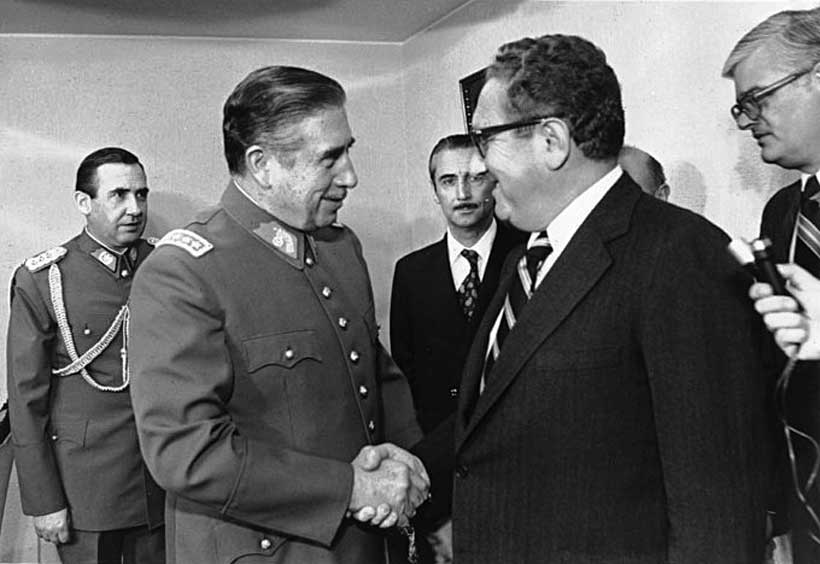From Vietnam to Videla: Henry Kissinger and the Forgotten Horrors of US Foreign Policy
The enduring impact of Henry Kissinger on the shaping of US foreign policy unveils a disconcerting narrative of power, diplomacy, and a callous disregard for human rights.
BY
LISDEY ESPINOZA PEDRAZA
DECEMBER 3, 2023

Augusto Pinochet shaking hands with Kissinger in 1976. This file is licensed under the Creative Commons Attribution 2.0 Chile license, via Wikipedia.
In the aftermath of World War II, the US emerged as a preeminent global power, and its foreign policy underwent a profound transformation shaped by the spectre of the Cold War. Defined by ideological rivalry with the Soviet Union, American foreign policy during this period was characterised by a strategic commitment to containment, preventing the spread of communism worldwide. The Truman Doctrine, Marshall Plan, and the establishment of NATO marked pivotal initiatives, reflecting a deep-seated determination to shape the post-war world order. This era saw the United States engage in complex geopolitical maneuvering, proxy conflicts, and diplomatic brinkmanship, as it sought to navigate the ideological fault lines that defined, both then and now, the Cold War. The ramifications of this foreign policy approach were vast, influencing international alliances, regional dynamics, and shaping the trajectory of global events for decades to come.
Henry Kissinger ascended to prominence in the United States during a pivotal era in global politics. Unbeknown to many, Henry Kissinger was born in Germany in 1923, fled the Nazis, and eventually found refuge in the United States, where he ended up becoming a professor at Harvard University. However, it was in the realm of foreign policy that Kissinger truly made his mark. Rising to prominence as National Security Advisor and later as Secretary of State under both Presidents Richard Nixon and Gerald Ford, Kissinger played a central role in shaping US international relations during the Cold War. Renowned for his realpolitik approach, he engaged in high-stakes diplomacy leaving an indelible mark on the geopolitical landscape.
In the annals of history, the enduring impact of Henry Kissinger on the shaping of US foreign policy unveils a disconcerting narrative of power, diplomacy, and a callous disregard for human rights. While his name is often associated with Southeast Asia and Cold War negotiations, the indelible scars of his influence in Latin America remain a lesser-explored facet of his legacy.
Against the backdrop of the Cold War, American foreign policy was driven by the overarching goal of containing the spread of communism globally. This geopolitical context provided the impetus for interventions and alliances that frequently prioritised strategic interests over democratic ideals, and the complete disregard of human rights.
More:
https://moderndiplomacy.eu/2023/12/03/from-vietnam-to-videla-henry-kissinger-and-the-forgotten-horrors-of-us-foreign-policy/
